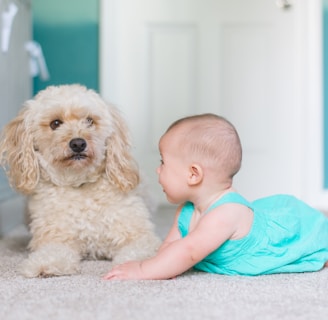Is a pet like a child? Exploring the psychology behind the bond and dependence


The total dependence of pets and the psychology behind this phenomenon
Pets are completely dependent on their owners to meet all their basic needs, which include food, shelter, medical care, and affection. Unlike human children, who eventually grow and reach a degree of independence, pets rely on their owners throughout their entire lives. This total dependence not only shapes the behavior of pets but also has profound implications for the psychology of both the animals and the humans who care for them.
From the pet's perspective, this dependence can manifest in a range of behaviors and attitudes. For example, dogs may develop separation anxiety when their owners are not present, as their emotional well-being is closely tied to the presence and attention of their caregivers. Cats, although often considered more independent, also show signs of emotional dependence, such as seeking their owner's proximity and consistently displaying affection.
For pet owners, this dependent relationship can foster a deep sense of responsibility and purpose. Meeting the needs of a pet can be demanding, but it also provides a constant source of emotional satisfaction. The relationship between an owner and their pet can be especially meaningful for people who live alone or seek a consistent emotional connection. The need to care for another being can help reduce feelings of loneliness and provide structure and routine to daily life.
Moreover, this constant responsibility can affect the mental health of pet owners. Studies have shown that interaction with pets can lower stress and anxiety levels, encourage the production of oxytocin and other well-being-related chemicals, and generally improve quality of life. However, the pressure of being the sole provider for all of a pet's needs can also be stressful for some, especially in cases of illness or financial hardship.
The nature of the bond between humans and pets
The bond between humans and their pets is a complex and deep phenomenon, characterized by a series of interactions that foster an intense emotional relationship. Often, this bond is compared to the one shared with a child due to the total dependence pets have on their owners. However, this relationship has its own particularities. Pets rely entirely on humans for their survival, which generates a level of care and responsibility that can be very similar to the experience of raising a child.
The development of this bond is based on daily interactions, constant care, and shared moments that strengthen the emotional connection. The routine of feeding, walking, and playing with a pet not only meets the animal’s basic needs but also creates a space for mutual connection and affection. These shared moments reinforce the perception of pets as valuable family members, contributing to a relationship in which the owner feels an emotional responsibility similar to that with their children.
Additionally, numerous studies have shown that the bond with a pet can have a significant positive impact on people's mental and emotional health. Interacting with pets can reduce levels of stress, anxiety, and depression, promoting a sense of well-being and companionship. This type of emotional relationship can be especially beneficial for people who live alone or who have difficulty forming social connections with other humans.
The perception of pets as children varies significantly across cultures. In some societies, pets are viewed primarily as companion animals, while in others, they are given a status nearly equal to that of a family member. This cultural variation influences how we treat our pets and the intensity of the bond we develop with them. In any case, the relationship between humans and pets is a reflection of our capacity to give love and care, and of the importance these small companions hold in our lives.
Coping with the loss of a pet
When a beloved pet passes, the grief can be overwhelming. Our pets are more than just animals; they are companions, family members, and a constant source of love. The emotional pain of losing them can mirror, and sometimes even exceed, the grief experienced in other forms of loss. Many people feel a deep emptiness, sadness, and even guilt, as their daily routines change and they are left to navigate life without their trusted companion.
But you don’t have to face this loss alone. Our Personalized Pet Grieving Program is designed to support you through this challenging time. Combining personal experience with the latest research in grief therapy, our 4-week program offers activities tailored specifically to your emotional needs, based on proven techniques to help you process your grief.
If you’re struggling with the loss of a pet, we are here to help you find peace, comfort, and a path toward healing.
